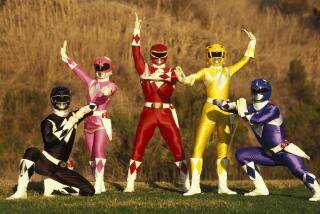‘Power Rangers’ Seen as Unruly Models to Youths : Research: Cal State Fullerton study concludes that children exposed to TV heroes are more aggressive toward counterparts.
- Share via
FULLERTON — Allowing your children to watch “Mighty Morphin Power Rangers” can be dangerous to other children’s health.
That warning comes from Cal State Fullerton researchers, who observed as children exposed to a “Power Rangers” episode immediately responded by harassing playmates with karate kicks and aggressive shoves.
Children who weren’t allowed to watch the single episode of the Fox mega-hit did nothing worse than take other youngsters’ crayons in the hour after the show, the observers found in their two-day study last fall.
“One of the scary things about violence in the media is it gives children new ideas about how to be aggressive and be violent,” said Chris Boyatzis , an assistant professor in Cal State Fullerton’s child development department, who oversaw the study. The show “transmits specific forms of violent behavior that the kids may not know” before they watch.”
“I think parents need to observe what their children are watching,” said Kristen Nesbitt, a 23-year-old senior who said she will submit the results of what began as a simple class project for publication in a psychology journal. “A lot of times, kids take what they see on TV out to the real world.”
What millions of children see each week on “Power Rangers” is five teen-agers “morphing” into spandex-clad super-heroes who use karate chops and magic swords to conquer monsters sent to Earth by “Rita Repulsa, the Empress of Evil.”
The show’s creators at Saban Entertainment deny that it makes youngsters violent, saying that each episode concludes with a positive message, and that children who watch the live-action show know the fight scenes are just fantasy. A publicist for the producer declined further comment, saying he had not yet seen the study.
But Boyatzis called that argument “dangerous and misleading.
“Even if the producers think it’s clearly marked as fantasy, the kids are still going to copy it, fantasy or not,” Boyatzis said.
Boyatzis acknowledged that his students’ observations merely validate “hundreds” of earlier research studies showing that violence on television can lead to violent behavior in real life. But he said that the “contribution of our study is that we’re looking at ‘Power Rangers,’ which is the hottest thing right now. Here is clear evidence that ‘Power Rangers’ is leading to more aggressive behavior in children.”
Last October, Nesbitt and research partner Gina Matillo, another undergraduate studying child development, split 52 after-school day-care students at Brea’s Mariposa Elementary School into two groups.
They showed one group of the 6- to 11-year-olds a 23-minute episode of “Power Rangers” that contained 140 aggressive acts, according to their count. Then the researchers watched the children play indoors, just as they do each afternoon as they await their parents. Parents gave permission for the children to participate in the research.
The next day, the researchers watched the second group playing with the same toys in the same room, but without having first seen “Power Rangers.”
The students watched each child in the two groups for two minutes apiece, logging every act of aggression, including karate moves, hitting, pushing and stealing. They found that the children who had just watched “Power Rangers” were aggressive six times more often than the children who had not watched the show.
The children who had watched “Power Rangers” imitated the martial arts sequences down to specific kicks, somersaults and arm movements--even echoing the sounds that the characters made during the show’s fight scenes, the researchers reported.
The monster battle scenes were part of a Japanese television program show from several years ago that has been dubbed and incorporated into “Mighty Morphin Power Rangers.”
Boyatzis and his students are preparing their findings for submission to a psychology journal and have submitted them to the Social Ecology Research Conference to be held at UC Irvine in April. They have not heard if their paper has been accepted.
Boyatzis said the brief study and small sample did not detract from the validity of the researchers’ conclusions. “If we can get such heightened aggression from just one episode, then that’s all the more reason to be alarmed,” he said. He said the sample of 52 children was “legitimate” for research purposes.
The show grabbed headlines last year when it became the nation’s top-ranked children’s program and parents scrambled to find “Power Rangers” action figures in the midst of a Christmastime shortage.
Boyatzis said he is one of those who has not joined the craze. “I have a daughter who’s 7 1/2. I’ve never let her watch it and I probably never will.”
More to Read
The complete guide to home viewing
Get Screen Gab for everything about the TV shows and streaming movies everyone’s talking about.
You may occasionally receive promotional content from the Los Angeles Times.






